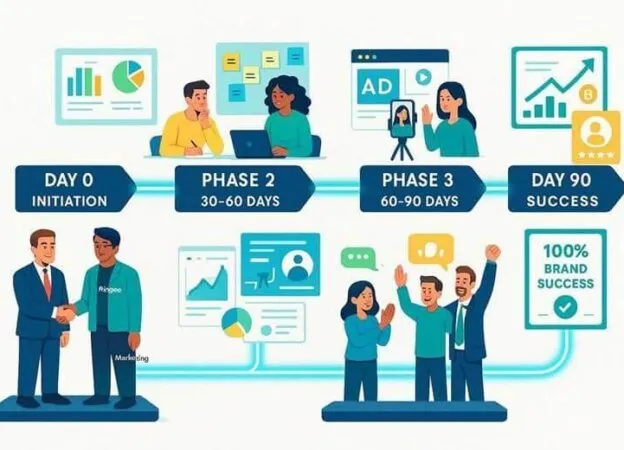Establishing a strong online presence is crucial for organizations of all types, including religious institutions. For churches looking to expand their reach and connect with members both old and new, developing an effective digital marketing strategy is essential.
Table of Contents
This guide is designed to provide top tips and actionable insights for churches keen on navigating the digital landscape. From leveraging social media to optimizing your website for search engines, we’ll explore the key components of a digital marketing strategy that resonates with your community and beyond.
Whether you’re starting from scratch or looking to refine your existing efforts, these tips will lay the foundation for a more engaged and growing congregation.

Understanding Your Audience
Before crafting any digital marketing content, it’s imperative that churches first understand their audience. This involves recognizing not only the demographics of your current congregation but also identifying the broader community you wish to reach. Consider factors such as age, interests, geographical location, and digital consumption habits.
Surveys, social media analytics, and direct feedback can provide valuable insights into your audience’s preferences and how they engage online. By tailoring your content and platforms to meet these preferences, you’ll be more likely to resonate with both existing members and potential newcomers.

Equally, understanding your audience’s spiritual needs and questions can guide your content creation. This means not only promoting church events or services but also sharing inspirational messages, educational materials, and answers to common theological questions.
A successful digital marketing strategy for churches goes beyond surface-level engagement; it seeks to foster a deeper spiritual connection and sense of community among its audience. This dual approach of meeting both digital and spiritual needs can significantly enhance your church’s online presence and impact.
Using SEO to Boost Visibility
Search engine optimization (SEO) is a powerful tool for increasing online visibility and reaching a wider audience. By optimizing your website and social media profiles with relevant keywords, you can improve your search engine ranking and appear in more searches related to your church’s mission or events.
Consider using tools like Google Keyword Planner or SEMrush to identify relevant keywords for your organization. Incorporate these keywords naturally into your website content, blog posts, and social media captions to increase your chances of ranking higher in search results.
As the people from ReachRight put it, SEO is key for churches, enabling them to show up in ‘near me’ searches and connect with the local community effectively, while maintaining a balance with global SEO to reach a wider audience.
Plus, incorporating local keywords into your content can help potential members find your church when searching for a place of worship in their area.
Leveraging Social Media Effectively
Social media platforms are invaluable tools for expanding your church’s outreach. They provide a space for sharing inspirational messages, event announcements, and engaging content that reflects your church’s mission and values.
The key is consistency and authenticity; ensure your social media presence mirrors the warmth and welcoming nature of your church. To maximize impact, consider using a mix of content types, such as videos, live streams of services, and interactive Q&As.
These diverse formats keep your audience engaged and encourage sharing, further amplifying your reach. Remember, social media is also a two-way street—actively respond to comments and messages to foster a sense of community online.
Creating A User-Friendly Website
Your church’s website is often the first point of contact for potential new members. It should be visually appealing, easy to navigate, and up-to-date with the latest information about services, events, and community programs. High-quality images and videos of past events can also help visitors get a feel for your church community.
In addition to aesthetics, your website must be optimized for search engines (SEO). This means using relevant keywords, ensuring fast load times, and having a mobile-responsive design. A well-optimized website increases the likelihood of appearing in search results when people look for churches in your area.
Implementing Email Marketing
Email marketing is an effective way to maintain communication with your congregation and reach out to potential new members. It allows for direct, personalized contact with your audience, keeping them updated on upcoming events, services, and church news.
To start, build a subscription list by encouraging website visitors and social media followers to sign up. It’s important to segment your list based on interest or participation level to ensure that the content is relevant to each subscriber.
Using a platform like Mailchimp or Constant Contact, you can design visually appealing emails that embody the spirit of your church and automate the distribution process, making it easier to stay in touch regularly. However, it’s crucial to balance frequency and content to avoid overwhelming your subscribers.
Aim for a regular schedule that keeps your church top-of-mind without becoming intrusive. Each email should provide value, whether it’s spiritual enrichment through a thoughtful message, information about upcoming community events, or resources for personal growth.
By integrating email marketing into your digital strategy, you create another touchpoint for engagement that can deepen relationships and foster a strong sense of belonging among your church community.
Utilizing Content Marketing
Content marketing stands as a pivotal component of a comprehensive digital marketing strategy for churches. It not only amplifies your church’s voice but also establishes your church as a trustworthy source of spiritual guidance and community support.
By creating and sharing high-quality content—such as blog posts, videos, and podcasts that address your audience’s spiritual questions and interests—you engage with your community on a deeper level.
A blog on your website can be a great platform for sharing insights from church leaders, testimonies from members, and updates on community projects. This not only enriches the spiritual life of your audience but also boosts SEO, driving more traffic to your site.
Video content has emerged as an especially powerful tool in the digital age, and churches can leverage this to reach a wider audience. Recording and sharing sermons, creating short inspirational videos, or offering virtual tours of your church can make your digital presence more dynamic and accessible.
Videos can be shared across social media platforms and your website, offering diverse entry points for people to connect with your church. Video content is highly shareable and can significantly increase engagement, making it a key element in your content marketing strategy.
Another effective approach within content marketing is the use of podcasts. Podcasts offer a unique way to reach out to your community, providing spiritual nourishment through sermons, Bible studies, and discussions on faith. They can be listened to anytime, anywhere, which makes them particularly appealing in today’s fast-paced world.
Creating a podcast series that explores different aspects of your faith or responds to questions from your congregation can foster a stronger connection with your community and provide a valuable resource for spiritual growth.
Through consistent, high-quality content marketing efforts, your church can build a stronger, more engaged online community.
Engaging with Online Communities
Online forums and communities offer another avenue for churches to connect with their audience. Participating in relevant discussions, offering support, and sharing insights can establish your church as a valuable community member.
Whether it’s on Reddit, specialized forums, or Facebook groups, engagement needs to be genuine and reflective of your church’s values.
Building relationships in these spaces can encourage individuals to explore your church further, either by visiting your website, attending a service, or participating in events. It’s a low-pressure approach to outreach that focuses on building connections and providing value.
Analytics and Feedback
Understanding the performance of your digital marketing efforts is crucial. Utilize analytics tools to track website traffic, social media engagement, and email open rates. This data provides insights into what’s working and what isn’t, allowing for informed adjustments to your strategy.
Additionally, seek feedback directly from your audience. Surveys, comment sections, and direct messages are great ways to gather opinions and suggestions. Use this feedback to refine your approach, making your digital marketing efforts even more effective and aligned with your congregation’s needs.
Continuous Learning and Adaptation
The digital landscape is always changing, with new platforms, trends, and technologies emerging regularly. Staying informed about these developments and being willing to adapt your strategies accordingly is key to maintaining an effective digital marketing presence for your church.
Encourage your team to participate in digital marketing workshops and webinars, follow industry blogs, and engage in professional networking. This commitment to learning and adaptation ensures your church remains at the forefront of digital engagement, ready to welcome and connect with members in meaningful ways.

An effective digital marketing strategy is not just beneficial; it’s essential for churches aiming to grow their congregation and deepen their community ties.
By understanding your audience, leveraging SEO, making the most of social media, creating a user-friendly website, utilizing email marketing, engaging in content marketing, connecting through online communities, and consistently reviewing analytics for feedback, any church can build a robust online presence.
Remember, digital marketing for churches is not about quick fixes but building long-lasting relationships with your community. It’s about connecting in meaningful ways, sharing your message, and providing value that resonates both online and offline.
As digital landscapes evolve, so should your strategies, with a continual focus on learning and adaptation. Integrating these practices into your church’s outreach efforts will pave the way for a more engaged, informed, and inspired community, ensuring your church’s message spreads far and wide in the digital age.
Digital Marketing Strategy For Churches – FAQs
1. Can digital marketing actually help in growing my church’s congregation?
Yes, digital marketing can significantly help in growing your church’s congregation. By leveraging various digital channels—such as social media, email, and your church’s website—you can reach a wider audience, engage with community members, and attract newcomers to your church.
By providing valuable content and fostering genuine connections online, you can increase visibility and interest in your church.
2. How often should we post content on our church’s social media accounts?
The frequency of posting on social media can vary depending on your team’s capacity and your audience’s preferences. However, a general recommendation is to post at least 3-4 times per week to maintain engagement and keep your church visible in your community’s social media feeds.
Pay attention to your audience’s engagement and adjust your posting frequency accordingly.
3. Is SEO really important for a church’s website?
Absolutely. SEO is crucial for any website, including those of churches, as it helps improve your site’s visibility on search engines like Google.
By optimizing your website with relevant keywords and ensuring it’s mobile-friendly with fast loading times, you can increase the chances of people finding your church when they’re searching for places of worship or community events in your area.
4. What kind of email content should we send to our congregation?
Your email content should be varied, engaging, and reflect the values and activities of your church. Include updates on upcoming events, community projects, inspirational messages, and educational content.
Personalize your emails as much as possible to make your congregation feel valued and connected to the church community. Segmentation can be used to tailor messages to different groups within your congregation, such as new members, regular attendees, and volunteers.
5. How can we measure the success of our digital marketing efforts?
Success can be measured using various analytics tools that track website traffic, social media engagement, email open rates, and event attendance.
Set clear goals for your digital marketing efforts and use these tools to assess performance against these goals. Regularly reviewing these metrics will help you understand what strategies are effective, what needs improvement, and how closely you are meeting your congregation’s needs and interests.



